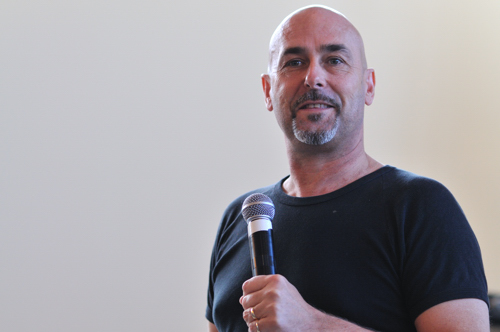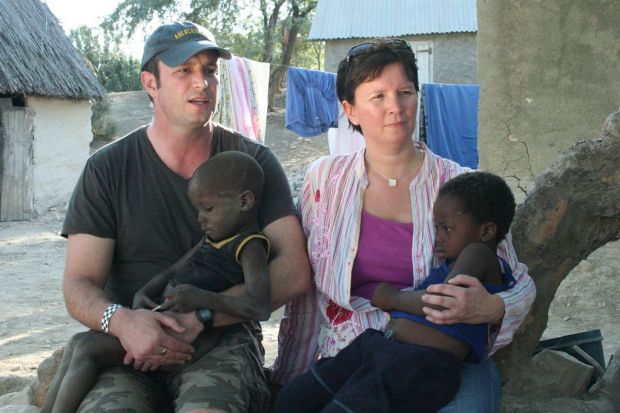Alan lives very near Azusa Street, where the Holy Spirit came up many very marginalised people, which went on to be a movement that changed the world. Jesus is the friend of the outcast and the sinners!

What practices stop the people of God being the people of God? Christianity got into China from Europe, and there were 2 million Christians, until Mao Tse Tung obliterated it. How? Threw out the leaders etc. Except for peasant people who were forced to rediscover themselves.
Compare that phenomenon with that of the early church. We have to ask, what am I doing that God has to take people like us out – to get what he wants done, done?
Don’t create systems that create dependences.
Go with the flow of what God wants done in us. He has what it takes. And he has given us agency!
We need to receive the gift of repentance, be immediately forgiven – then change our behaviours.
Rodney Stark & Roger Fink described how Methodism in the USA grew like mad, then plateaued – then dropped off a cliff.
It started with the Methodist circuit riders blazing trails. Radical pioneers.
Then they took them out and got them to study Latin, Greek and Hebrew, domesticated them.
And have been in decline ever since.
If it takes seven years to train in CofE as a leader – you have over-complicated it.
Our methodology is blocking us.
In China, 65% of the leaders are women. What does that tell us? 2 million to hundreds of millions in a very short space of time.
If I was the devil and I wanted to take the church out, I’d create an elite two -tier system with cleros (calling) being to clergy – rather than ALL God’s people being called. Yes, believe in leadership, but don’t take all the leadership on.
If you want to destroy a movement – don’t make it easily reproducible. The genius of Al Quaeda is that is so diverse – (I think there’s references to this in Starfish & Spider?).
Someone asks – ‘how do you make a case for the ordination of women?’
Well – what about making a case for ordination at ALL first off. It came out of Rome not the NT. It doesn’t honour Jesus to suppress anyone. Our practices are our problems.
The ‘Back to Jerusalem’ movement have this slogan: ‘Every believer is a church planter, every church is a church planting church.’ We all contain ecclesia…
So even if there’s only ONE believer left, he or she carries the seed to reproduce the whole movement. God got the whole universe going in a particular way. In every seed there’s a tree and in very tree there’s a forest – there’s POTENTIAL, contained. A spark has the potential for a fire.
This is how God sees us.
We need to see our churches like this.
The potential is HUGE!
It’s amazing what God can do with us. So a leader’s job is to bring EVERYONE into the game.
When we have thought of church planting, we have thought we have to extract people from the domains of everyday life. How about we rather plant church IN the domains of society, and let it break out in the arts and media and government.
Someone ask, ‘How do we control that?’
Trust God. He is able to lead!
God is not simply God of the church, but of all we are. We locate God in our structure (which is just one way to manifest His presence).
The best way to learn chess? Take the Queen out. Then you learn how to use all the other pieces.
Are we over-relying on the Sunday services? Even very good ones with great teaching.
To see how effective your sermons are, next week – ask, ‘What did I preach about three weeks ago?’
What if we put all that effort into disciple-making instead?
It takes time at the front end, but it’s the way of multiplication.
We believe in ‘the priesthood of all believers,’ but it’s largely a doctrine not a practice. As long as you’re wearing a collar it speaks louder than your words. You’re representing the institution. It’s very hard to get a person to understand something when their salary depends on not understanding it.
Look afresh at Ephesians, written as a general letter to a group of ordinary people, in various churches. This applies to everyone! It’s Paul’s fundamental ecclesiology. Barth Jr called it ‘the constititional document of the church.’ And it was NOT written to leaders. This is for everyone.
Eph 4:1-6 UNITY (applies not just to early church but all time)
Eph 4:7-11
Grace was given to EACH ONE OF US.. (literally us all). Give = aorist indicative, very strong and applies to all 5.
To become… APEST – apostles, prophets, evangelists, shepherds, teachers..
So, ‘I wonder what I am?’
He’s given APEST – to build the church. To get us to Maturity.
It’s Jesus’ intention that we find our place in this framework.
Vs 12 – 16 applies to the church of all time, too – you have to torture the obvious meaning of the chapter to say the preceding verses don’t!
Why did we code out the Apostles and Prophets and Evangelists?
How many times in the Bible do you hear the word Pastor? ONCE – here.
Apostles. gets used 80+ times.
Teachers – we get told by James ‘not many of you should be!’
But isn’t it dangerous to release the APE?
Well the Shepherds and Teachers who have run the church so far have historically hurt people over doctrine a lot. Inquisition etc.
This is not a leadership text, it’s a ministry text.
Apostle = missio, sent. people who feel God pushing them out into the future, they’re boundary people. Could be Petrine (in system) or Pauline (outside system).
Prophets – sensitive to God, hear him, see him, speak for Him. Irritate everyone as result. They feel deeply for the poor.
Evangelists – recruiters to the cause, people buy in because of them.
Shepherds – Bring love and community.
Teachers – Bring wisdom and understanding. No sense of urgency. Systematic.
You need ALL FIVE to change the world.
These 5 are of course in the creation order – you see such people in all kids of organisations, but he’s given it to the redemption order.
Ministries are started by the generative (APE) – and sustained by the operative (ST – maintainers).
The problems are when the APES are exiled, and the STs take over. Every movement in decline takes this model.
Jesus has given us (the church) FIVEFOLD ministry so we might MATURE!
Jesus is all 5. We are meant to be His body. How else can we represent HIM in the world? You can’t run an organisation on having a HR department.
If you want a missional movement you have to have missional ministry to go with it.
-15.022723
27.021990







You must be logged in to post a comment.